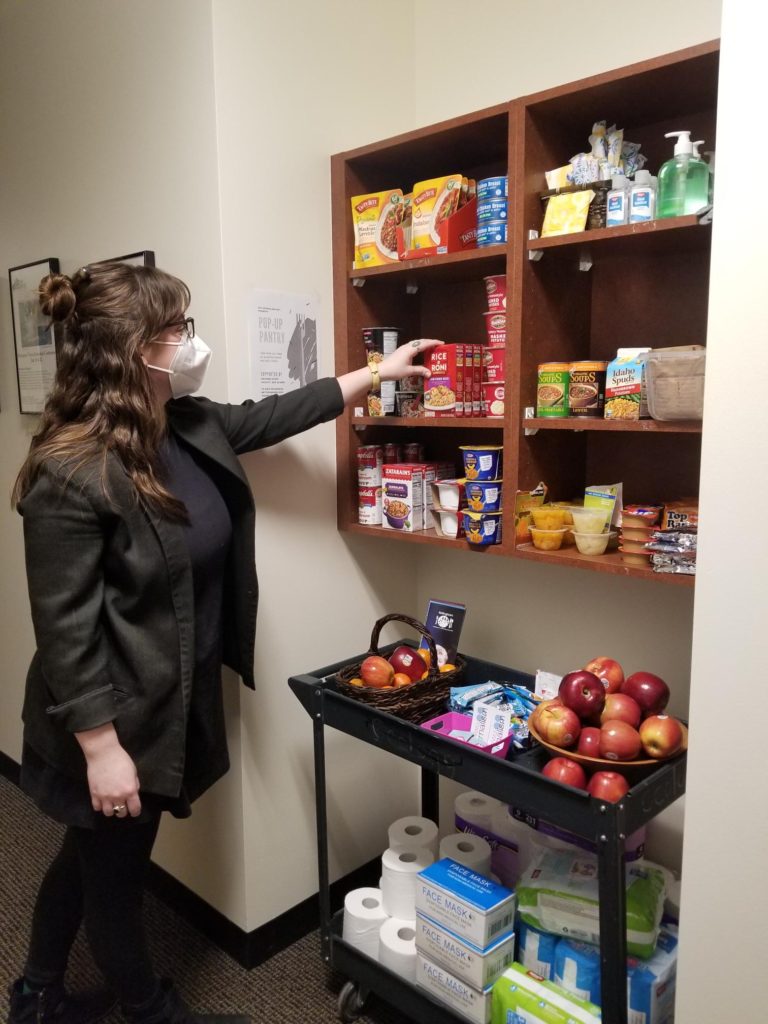Journalism faculty works together to create, maintain food pantry

Department's goal: substantial, sustainable resource for students
By Kiana Doyle
Apples, granola bars, Minute Rice, check. Menstrual pads, diapers, hand sanitizer, check. Together, journalism professor Betsy O’Donovan and I weaved through the Winco aisles as we crossed items off O’Donovan’s mental list of items to buy for the journalism department food pantry during winter quarter. The pantry, funded and routinely stocked by Western Washington University journalism faculty, was running low, and it was time for a refill.
O’Donovan, along with her husband and journalism instructor Jeff Shaw, started the food pantry in fall 2018 after O’Donovan read a 2017 project proposal from Western students concerning the issue of food insecurity on campus. Since then, there have been other investigations into the topic, such as a 2019 in-depth story written by a group of students in professor Carolyn Nielsen’s advanced reporting class, which would later be published by the Solutions Journalism Network.
With the knowledge about food insecurity at Western gained from these projects, the entire journalism department has worked together on the food pantry, unanimously voting in 2019 to sustain the pantry and continuing today to pool funds to maintain the resource.
O’Donovan said it has been very fulfilling for herself and the rest of the journalism department to be able to provide a food pantry for Western students.
“It’s been really exciting to do something so fundamental to students’ wellbeing and see how much energy and concern people bring to that effort,” O’Donovan said.
The pantry is located across from O’Donovan’s office in the journalism faculty hallway. There, students can stop by for snacks and meal kits, as well as other essentials such as socks, toilet paper and feminine products.
Since the start of the food pantry, knowledge of its existence has spread, and many students now frequent the pantry.
For fourth-year visual journalism student Garrett Rahn, the food pantry has provided a pick-me-up on more than one occasion.
“I really appreciate it because there’s a lot of moments of need where you’re like, ‘I don’t have time” or ‘I don’t have funds’ or ‘I don’t have the will to go actually get something,’ and it’s there for you,” Rahn said. “And that’s super helpful for us stressed out journalism students.”
Rahn said the pantry has been a lifesaver on busy days when he spends most of the day on campus, and he is a fan of the food variety.
“They always had such a great selection of items,” Rahn said. “I really appreciate that they have stuff for people like me who are picky.”
For students like Rahn, who is vegan, there are vegetarian and vegan-friendly options in the pantry, such as packages of coconut squash dal, Rahn’s personal favorite item from the pantry.

Jenny Bettis, journalism department manager, keeps a stock of food pantry items in her office and works to keep the pantry full and organized. She said as much as the food pantry has been able to function supported solely by faculty so far, it may not be a viable method to sustain the pantry compared to other established food pantries on campus, like the Western Hub of Living Essentials, which is able to receive donations via VikingFunder, Western’s crowdfunding platform.
“I don’t mind having food in my office, it makes me happy to be helping to fill up the pantry to make sure it’s stocked and stuff like that,” Bettis said. “But obviously, sustainability long-term is a question.”
The good news is there have been recent developments in the goal for a more sustainable food pantry. O’Donovan said Western has recently partnered with resource navigator Jon Stubblefield, who is coordinating student basic needs efforts on campus and has been in communication with the journalism department to explore sustainable funding options for the pantry.
As far as the future of the journalism department food pantry, we’ll have to wait and see.
“I think that there’s a lot of people in the department that really want to see it become a more substantial thing,” Bettis said. “So, hopefully between all the people that are putting in the effort it’ll happen.”
O’Donovan said donations are not tax deductible — yet — and are managed primarily through Venmo. For anyone who is interested in donating to the pantry, O’Donovan suggests reaching out to Bettis to set up donation transfers.
